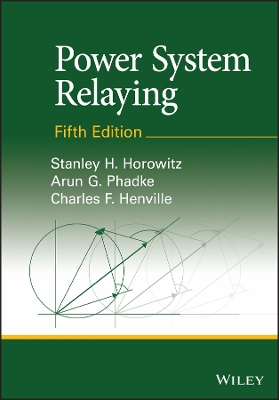Advances in Electric Power and Energy
 -15%
portes grátis
-15%
portes grátis
Advances in Electric Power and Energy
Static State Estimation
El-Hawary, Mohamed E.
John Wiley & Sons Inc
01/2021
512
Dura
Inglês
9781119480464
15 a 20 dias
848
Descrição não disponível.
About the Editor xi
About the Contributors xiii
Chapter 1 General Considerations 1
1.1 Prelude 1
1.2 Defining SSE 2
1.3 The Need for State Estimation 3
1.4 Static State Estimation in Practice 4
1.5 Applications That Use SE Solution 10
1.6 Overview of Chapters 13
Chapter 2 State Estimation In Power Systems Based On A Mathematical Programming Approach 23
2.1 Introduction 23
2.2 Formulation 24
2.3 Classical State Estimation Procedure 26
2.4 Mathematical Programming Solution 31
2.5 Alternative State Estimators 32
Part 1 System Failure Mitigation 59
Chapter 3 System Stress and Cascading Blackouts 61
3.1 Introduction 61
3.2 Cascading Blackouts and Previous Work 62
3.3 Problem Statement and Approach 66
3.4 DFAXes, Vulnerability, and Criticality Metrics 70
3.5 Validity of Metrics 78
3.6 Studies with Metrics 82
3.7 Summary 93
3.8 Application of Stress Metrics 94
3.9 Conclusions 94
Chapter 4 Model-Based Anomaly Detection For Power System State Estimation 99
4.1 Introduction 99
4.2 Cyberattacks on State Estimation 100
4.3 ATTACK-RESILIENT State Estimation 103
4.4 Model-Based Anomaly Detection 106
4.5 Conclusions 117
Chapter 5 Protection, Control, and Operation of Microgrids 123
5.1 Prelude 123
5.2 Introduction 126
5.3 State of the Art in Microgrid Protection and Control 128
5.4 Emerging Technologies 146
5.5 Test Case for DDSE 154
5.6 Test Results 159
5.7 Test Case for Adaptive Setting-Less Protection 161
5.8 Conclusions 167
Part 2 Robust State Estimation 171
Chapter 6 PSSE Redux: Convex Relaxation, Decentralized, Robust, And Dynamic Solvers 173
6.1 Introduction 173
6.2 Power Grid Modeling 174
6.3 Problem Statement 176
6.4 Distributed Solvers 186
6.5 Robust Estimators and Cyberattacks 193
6.6 Power System State Tracking 198
6.7 Discussion 202
Chapter 7 Robust Wide-Area Fault Visibility and Structural Observability In Power Systems With Synchronized Measurement Units 209
7.1 Introduction 209
7.2 Robust Fault Visibility Using Strategically Deployed Synchronized Measurements 210
7.3 Optimal PMU Deployment for System-Wide Structural Observability 221
7.4 Conclusions 229
Chapter 8 A Robust Hybrid Power System State Estimator With Unknown Measurement Noise 231
8.1 Introduction 231
8.2 Problem Statement 233
8.3 Proposed Framework for Robust Hybrid State Estimation 234
8.4 Numerical Results 245
8.5 Conclusions 249
Chapter 9 Least-Trimmed-Absolute-Value State Estimator 255
9.1 Bad Data Detection and Robust Estimators 256
9.2 Results and Discussion 266
9.3 Conclusions 287
Part 3 State Estimation For Distribution Systems 295
Chapter 10 Probabilistic State Estimation In Distribution Networks 297
10.1 Introduction 297
10.2 State Estimation in Distribution Networks 298
10.3 Improving Observability in Distribution Networks 309
10.4 Conclusion 324
Chapter 11 Advanced Distribution System State Estimation In Multi-Area Architectures 329
11.1 Issues and Challenges of Distribution System State Estimation 329
11.2 Distribution System Multi-Area State Estimation (DS-MASE) Approach 342
11.3 Application of the DS-MASE Approach 357
11.4 Validity and Applicability of DS-MASE Approach 369
Part 4 Parallel/Distributed Processing 375
Chapter 12 Hierarchical Multi-Area State Estimation 377
12.1 Introduction 377
12.2 Preliminaries 381
12.3 Modeling and Problem Formulation 385
12.4 A Brief Survey of Solution Techniques 387
12.5 Hierarchical State Estimator Via Sensitivity Function Exchanges 393
12.6 Add-On Functions in Multi-area State Estimation 399
12.7 Properties 401
12.8 Simulations 405
12.9 Conclusions 409
Chapter 13 Parallel Domain-Decomposition-Based Distributed State Estimation For Large-Scale Power Systems 413
13.1 Introduction 413
13.2 Fundamental Theory and Formulation 416
13.3 Experimental Results 436
13.4 Conclusion 449
Chapter 14 Dishonest Gauss-Newton Method-Based Power System State Estimation On A GPU 455
14.1 Introduction 455
14.2 Background 456
14.3 Performance of Dishonest Gauss-Newton Method 461
14.4 GPU Implementation 463
14.5 Simulation Results 467
14.6 Discussions on Scalability 468
14.7 Distributed Method of Parallelization 470
14.8 Conclusions 473
Index 475
About the Contributors xiii
Chapter 1 General Considerations 1
1.1 Prelude 1
1.2 Defining SSE 2
1.3 The Need for State Estimation 3
1.4 Static State Estimation in Practice 4
1.5 Applications That Use SE Solution 10
1.6 Overview of Chapters 13
Chapter 2 State Estimation In Power Systems Based On A Mathematical Programming Approach 23
2.1 Introduction 23
2.2 Formulation 24
2.3 Classical State Estimation Procedure 26
2.4 Mathematical Programming Solution 31
2.5 Alternative State Estimators 32
Part 1 System Failure Mitigation 59
Chapter 3 System Stress and Cascading Blackouts 61
3.1 Introduction 61
3.2 Cascading Blackouts and Previous Work 62
3.3 Problem Statement and Approach 66
3.4 DFAXes, Vulnerability, and Criticality Metrics 70
3.5 Validity of Metrics 78
3.6 Studies with Metrics 82
3.7 Summary 93
3.8 Application of Stress Metrics 94
3.9 Conclusions 94
Chapter 4 Model-Based Anomaly Detection For Power System State Estimation 99
4.1 Introduction 99
4.2 Cyberattacks on State Estimation 100
4.3 ATTACK-RESILIENT State Estimation 103
4.4 Model-Based Anomaly Detection 106
4.5 Conclusions 117
Chapter 5 Protection, Control, and Operation of Microgrids 123
5.1 Prelude 123
5.2 Introduction 126
5.3 State of the Art in Microgrid Protection and Control 128
5.4 Emerging Technologies 146
5.5 Test Case for DDSE 154
5.6 Test Results 159
5.7 Test Case for Adaptive Setting-Less Protection 161
5.8 Conclusions 167
Part 2 Robust State Estimation 171
Chapter 6 PSSE Redux: Convex Relaxation, Decentralized, Robust, And Dynamic Solvers 173
6.1 Introduction 173
6.2 Power Grid Modeling 174
6.3 Problem Statement 176
6.4 Distributed Solvers 186
6.5 Robust Estimators and Cyberattacks 193
6.6 Power System State Tracking 198
6.7 Discussion 202
Chapter 7 Robust Wide-Area Fault Visibility and Structural Observability In Power Systems With Synchronized Measurement Units 209
7.1 Introduction 209
7.2 Robust Fault Visibility Using Strategically Deployed Synchronized Measurements 210
7.3 Optimal PMU Deployment for System-Wide Structural Observability 221
7.4 Conclusions 229
Chapter 8 A Robust Hybrid Power System State Estimator With Unknown Measurement Noise 231
8.1 Introduction 231
8.2 Problem Statement 233
8.3 Proposed Framework for Robust Hybrid State Estimation 234
8.4 Numerical Results 245
8.5 Conclusions 249
Chapter 9 Least-Trimmed-Absolute-Value State Estimator 255
9.1 Bad Data Detection and Robust Estimators 256
9.2 Results and Discussion 266
9.3 Conclusions 287
Part 3 State Estimation For Distribution Systems 295
Chapter 10 Probabilistic State Estimation In Distribution Networks 297
10.1 Introduction 297
10.2 State Estimation in Distribution Networks 298
10.3 Improving Observability in Distribution Networks 309
10.4 Conclusion 324
Chapter 11 Advanced Distribution System State Estimation In Multi-Area Architectures 329
11.1 Issues and Challenges of Distribution System State Estimation 329
11.2 Distribution System Multi-Area State Estimation (DS-MASE) Approach 342
11.3 Application of the DS-MASE Approach 357
11.4 Validity and Applicability of DS-MASE Approach 369
Part 4 Parallel/Distributed Processing 375
Chapter 12 Hierarchical Multi-Area State Estimation 377
12.1 Introduction 377
12.2 Preliminaries 381
12.3 Modeling and Problem Formulation 385
12.4 A Brief Survey of Solution Techniques 387
12.5 Hierarchical State Estimator Via Sensitivity Function Exchanges 393
12.6 Add-On Functions in Multi-area State Estimation 399
12.7 Properties 401
12.8 Simulations 405
12.9 Conclusions 409
Chapter 13 Parallel Domain-Decomposition-Based Distributed State Estimation For Large-Scale Power Systems 413
13.1 Introduction 413
13.2 Fundamental Theory and Formulation 416
13.3 Experimental Results 436
13.4 Conclusion 449
Chapter 14 Dishonest Gauss-Newton Method-Based Power System State Estimation On A GPU 455
14.1 Introduction 455
14.2 Background 456
14.3 Performance of Dishonest Gauss-Newton Method 461
14.4 GPU Implementation 463
14.5 Simulation Results 467
14.6 Discussions on Scalability 468
14.7 Distributed Method of Parallelization 470
14.8 Conclusions 473
Index 475
Este título pertence ao(s) assunto(s) indicados(s). Para ver outros títulos clique no assunto desejado.
Guide to advances in electric power and energy; introduction to electric power and energy; understanding electric power and energy; static state estimator; power system state estimation; math and state estimation in power systems
About the Editor xi
About the Contributors xiii
Chapter 1 General Considerations 1
1.1 Prelude 1
1.2 Defining SSE 2
1.3 The Need for State Estimation 3
1.4 Static State Estimation in Practice 4
1.5 Applications That Use SE Solution 10
1.6 Overview of Chapters 13
Chapter 2 State Estimation In Power Systems Based On A Mathematical Programming Approach 23
2.1 Introduction 23
2.2 Formulation 24
2.3 Classical State Estimation Procedure 26
2.4 Mathematical Programming Solution 31
2.5 Alternative State Estimators 32
Part 1 System Failure Mitigation 59
Chapter 3 System Stress and Cascading Blackouts 61
3.1 Introduction 61
3.2 Cascading Blackouts and Previous Work 62
3.3 Problem Statement and Approach 66
3.4 DFAXes, Vulnerability, and Criticality Metrics 70
3.5 Validity of Metrics 78
3.6 Studies with Metrics 82
3.7 Summary 93
3.8 Application of Stress Metrics 94
3.9 Conclusions 94
Chapter 4 Model-Based Anomaly Detection For Power System State Estimation 99
4.1 Introduction 99
4.2 Cyberattacks on State Estimation 100
4.3 ATTACK-RESILIENT State Estimation 103
4.4 Model-Based Anomaly Detection 106
4.5 Conclusions 117
Chapter 5 Protection, Control, and Operation of Microgrids 123
5.1 Prelude 123
5.2 Introduction 126
5.3 State of the Art in Microgrid Protection and Control 128
5.4 Emerging Technologies 146
5.5 Test Case for DDSE 154
5.6 Test Results 159
5.7 Test Case for Adaptive Setting-Less Protection 161
5.8 Conclusions 167
Part 2 Robust State Estimation 171
Chapter 6 PSSE Redux: Convex Relaxation, Decentralized, Robust, And Dynamic Solvers 173
6.1 Introduction 173
6.2 Power Grid Modeling 174
6.3 Problem Statement 176
6.4 Distributed Solvers 186
6.5 Robust Estimators and Cyberattacks 193
6.6 Power System State Tracking 198
6.7 Discussion 202
Chapter 7 Robust Wide-Area Fault Visibility and Structural Observability In Power Systems With Synchronized Measurement Units 209
7.1 Introduction 209
7.2 Robust Fault Visibility Using Strategically Deployed Synchronized Measurements 210
7.3 Optimal PMU Deployment for System-Wide Structural Observability 221
7.4 Conclusions 229
Chapter 8 A Robust Hybrid Power System State Estimator With Unknown Measurement Noise 231
8.1 Introduction 231
8.2 Problem Statement 233
8.3 Proposed Framework for Robust Hybrid State Estimation 234
8.4 Numerical Results 245
8.5 Conclusions 249
Chapter 9 Least-Trimmed-Absolute-Value State Estimator 255
9.1 Bad Data Detection and Robust Estimators 256
9.2 Results and Discussion 266
9.3 Conclusions 287
Part 3 State Estimation For Distribution Systems 295
Chapter 10 Probabilistic State Estimation In Distribution Networks 297
10.1 Introduction 297
10.2 State Estimation in Distribution Networks 298
10.3 Improving Observability in Distribution Networks 309
10.4 Conclusion 324
Chapter 11 Advanced Distribution System State Estimation In Multi-Area Architectures 329
11.1 Issues and Challenges of Distribution System State Estimation 329
11.2 Distribution System Multi-Area State Estimation (DS-MASE) Approach 342
11.3 Application of the DS-MASE Approach 357
11.4 Validity and Applicability of DS-MASE Approach 369
Part 4 Parallel/Distributed Processing 375
Chapter 12 Hierarchical Multi-Area State Estimation 377
12.1 Introduction 377
12.2 Preliminaries 381
12.3 Modeling and Problem Formulation 385
12.4 A Brief Survey of Solution Techniques 387
12.5 Hierarchical State Estimator Via Sensitivity Function Exchanges 393
12.6 Add-On Functions in Multi-area State Estimation 399
12.7 Properties 401
12.8 Simulations 405
12.9 Conclusions 409
Chapter 13 Parallel Domain-Decomposition-Based Distributed State Estimation For Large-Scale Power Systems 413
13.1 Introduction 413
13.2 Fundamental Theory and Formulation 416
13.3 Experimental Results 436
13.4 Conclusion 449
Chapter 14 Dishonest Gauss-Newton Method-Based Power System State Estimation On A GPU 455
14.1 Introduction 455
14.2 Background 456
14.3 Performance of Dishonest Gauss-Newton Method 461
14.4 GPU Implementation 463
14.5 Simulation Results 467
14.6 Discussions on Scalability 468
14.7 Distributed Method of Parallelization 470
14.8 Conclusions 473
Index 475
About the Contributors xiii
Chapter 1 General Considerations 1
1.1 Prelude 1
1.2 Defining SSE 2
1.3 The Need for State Estimation 3
1.4 Static State Estimation in Practice 4
1.5 Applications That Use SE Solution 10
1.6 Overview of Chapters 13
Chapter 2 State Estimation In Power Systems Based On A Mathematical Programming Approach 23
2.1 Introduction 23
2.2 Formulation 24
2.3 Classical State Estimation Procedure 26
2.4 Mathematical Programming Solution 31
2.5 Alternative State Estimators 32
Part 1 System Failure Mitigation 59
Chapter 3 System Stress and Cascading Blackouts 61
3.1 Introduction 61
3.2 Cascading Blackouts and Previous Work 62
3.3 Problem Statement and Approach 66
3.4 DFAXes, Vulnerability, and Criticality Metrics 70
3.5 Validity of Metrics 78
3.6 Studies with Metrics 82
3.7 Summary 93
3.8 Application of Stress Metrics 94
3.9 Conclusions 94
Chapter 4 Model-Based Anomaly Detection For Power System State Estimation 99
4.1 Introduction 99
4.2 Cyberattacks on State Estimation 100
4.3 ATTACK-RESILIENT State Estimation 103
4.4 Model-Based Anomaly Detection 106
4.5 Conclusions 117
Chapter 5 Protection, Control, and Operation of Microgrids 123
5.1 Prelude 123
5.2 Introduction 126
5.3 State of the Art in Microgrid Protection and Control 128
5.4 Emerging Technologies 146
5.5 Test Case for DDSE 154
5.6 Test Results 159
5.7 Test Case for Adaptive Setting-Less Protection 161
5.8 Conclusions 167
Part 2 Robust State Estimation 171
Chapter 6 PSSE Redux: Convex Relaxation, Decentralized, Robust, And Dynamic Solvers 173
6.1 Introduction 173
6.2 Power Grid Modeling 174
6.3 Problem Statement 176
6.4 Distributed Solvers 186
6.5 Robust Estimators and Cyberattacks 193
6.6 Power System State Tracking 198
6.7 Discussion 202
Chapter 7 Robust Wide-Area Fault Visibility and Structural Observability In Power Systems With Synchronized Measurement Units 209
7.1 Introduction 209
7.2 Robust Fault Visibility Using Strategically Deployed Synchronized Measurements 210
7.3 Optimal PMU Deployment for System-Wide Structural Observability 221
7.4 Conclusions 229
Chapter 8 A Robust Hybrid Power System State Estimator With Unknown Measurement Noise 231
8.1 Introduction 231
8.2 Problem Statement 233
8.3 Proposed Framework for Robust Hybrid State Estimation 234
8.4 Numerical Results 245
8.5 Conclusions 249
Chapter 9 Least-Trimmed-Absolute-Value State Estimator 255
9.1 Bad Data Detection and Robust Estimators 256
9.2 Results and Discussion 266
9.3 Conclusions 287
Part 3 State Estimation For Distribution Systems 295
Chapter 10 Probabilistic State Estimation In Distribution Networks 297
10.1 Introduction 297
10.2 State Estimation in Distribution Networks 298
10.3 Improving Observability in Distribution Networks 309
10.4 Conclusion 324
Chapter 11 Advanced Distribution System State Estimation In Multi-Area Architectures 329
11.1 Issues and Challenges of Distribution System State Estimation 329
11.2 Distribution System Multi-Area State Estimation (DS-MASE) Approach 342
11.3 Application of the DS-MASE Approach 357
11.4 Validity and Applicability of DS-MASE Approach 369
Part 4 Parallel/Distributed Processing 375
Chapter 12 Hierarchical Multi-Area State Estimation 377
12.1 Introduction 377
12.2 Preliminaries 381
12.3 Modeling and Problem Formulation 385
12.4 A Brief Survey of Solution Techniques 387
12.5 Hierarchical State Estimator Via Sensitivity Function Exchanges 393
12.6 Add-On Functions in Multi-area State Estimation 399
12.7 Properties 401
12.8 Simulations 405
12.9 Conclusions 409
Chapter 13 Parallel Domain-Decomposition-Based Distributed State Estimation For Large-Scale Power Systems 413
13.1 Introduction 413
13.2 Fundamental Theory and Formulation 416
13.3 Experimental Results 436
13.4 Conclusion 449
Chapter 14 Dishonest Gauss-Newton Method-Based Power System State Estimation On A GPU 455
14.1 Introduction 455
14.2 Background 456
14.3 Performance of Dishonest Gauss-Newton Method 461
14.4 GPU Implementation 463
14.5 Simulation Results 467
14.6 Discussions on Scalability 468
14.7 Distributed Method of Parallelization 470
14.8 Conclusions 473
Index 475
Este título pertence ao(s) assunto(s) indicados(s). Para ver outros títulos clique no assunto desejado.







